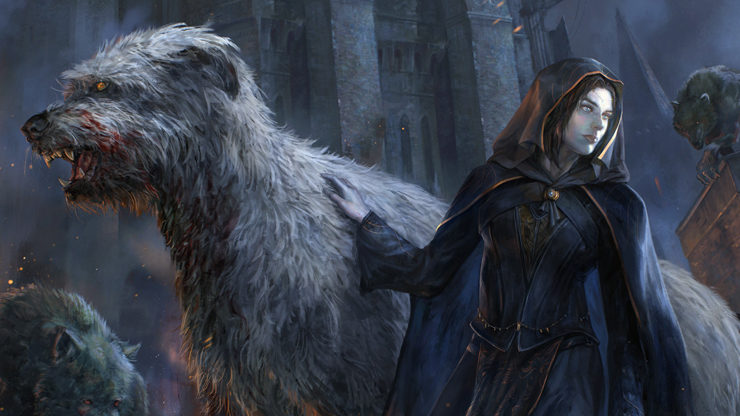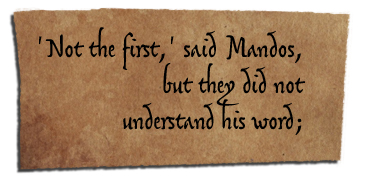In Which Sauron Gets His Ass Handed to Him, Beren and Lúthien Cosplay As Bad Guys Then Infiltrate Angband, A Big Wolf Goes Ballistic, and Huan Is Such A Good Boy
We return now to the second half “Of Beren and Lúthien,” Chapter 19 of The Silmarillion. The first half of the story included the first meeting of the titular lovers, the pride and folly of King Thingol, the curse of Mandos falling upon Doriath, and more oaths than you can shake wrathful fist at. Beren accepted the quest to recover a Silmaril from the crown of Morgoth, then got himself and his new friends locked up in Sauron-jail. Which, in turn, led to the sad death of Finrod Felagund. Middle-earth is a slightly darker place now.
Now as previously mentioned, I’ve written about this story twice before, with some shifting emphasis in discussion, but for continued Primer treatment, read on. This chapter, as we’ll see, involves a real show of hands…
Dramatis personæ of note:
- Sauron – Maia, shapechanging master of Tol-in-Gaurhoth
- Beren – Man, son of Barahir, temporarily two-handed
- Lúthien – Maia-blooded Sinda, badass mofo
- Huan – Valinorian hound, very good boy
- Draugluin – Papa Werewolf
- Celegorm – Noldo, egregious jerk, son of Fëanor #3
- Curufin – Noldo, another egregious jerk, son of Fëanor #5
- Carcharoth – Wolf with a capital W
- Morgoth – Dark Lord, simmering asshole, tyrant in [an iron] tiara
- Thingol – Sinda, king, father-in-law
Of Beren and Lúthien, continued
Sauron means “the Abhorred” in Quenya, and he’s earned the name plenty already. As the master of Tol-in-Gaurhoth, the Isle of Werewolves, he’s captured many Elves already; a bunch of thralls languish in his pits even now. But only one from his most recent batch of prisoners is left: Beren son of Barahir, whose quest for a Silmaril seems to have stopped short. Finrod Felagund, the fairest of kings and bestest of friends, lies dead beside him, having saved him. And maybe all for naught.
But before Sauron sends another werewolf down to start chomping on him, Lúthien and Huan arrive at the bridge outside. The first thing the Elfmaiden does is sing, and since she’s the daughter of Melian, her song’s got some serious resonance. It penetrates the very stones of the tower, going out like a net that opens the lines of communication. Beren, in his pit, hears it but believes he’s just dreaming—his Tinúviel surely wouldn’t be here in this horrid place!—but he sings in answer. It’s all he can manage before passing out.
Interestingly, his song of choice invokes the Valacirca, the Sickle of the Valar, a constellation of stars that Varda herself made in Chapter 3 as a veritable middle finger to Morgoth thousands of years ago. As if emboldened by her lover’s voice—he’s alive and still defiant, if terribly weak—Lúthien starts up a new song “of greater power.” Lúthien is clearly some kind of high-level bard. She carries no sword and wears no armor—except her sleep-inducing hair cloak—but she has her voice and her courage. Oh, and a big-ass, sentient wolf-slaying dog who’s just the best.
With his tower trembling beneath him, Sauron and all his wolves take notice. But he, not fully grasping the gravity of the situation, is actually pleased. He smiles, “wrapped in his black thought,” for he knows precisely who Lúthien is and thinks that if he can hand her over to Morgoth, “his reward would be great.” Maybe he’ll finally be Employee of the Age and knock that smug look off Gothmog’s face.
The first thing he does—because Dark Lords and future Dark Lords in Arda love sending others to do their dirty work, if they can help it—is to order a werewolf, then another, then another, to “greet” the famous daughter of Melian and her little dog, too. One by one this not-so-little dog slays each werewolf, biting them in the throat, until Sauron eventually realizes this is no runt at his doorstep. It’s time to send in the dreaded father of all of Angband’s werewolves: Draugluin, who is “old in evil” and whose name totally means “blue wolf,” so he’s probably got a lovely blue-gray coat.
This time it’s no quick kill, but Huan still wins the day. Draugluin really makes Huan work for his victory, for he is especially big and nasty…but he is clearly not the prophesied “mightiest wolf that would ever walk the world,” else this would be Huan’s death. The thought that it might be surely crosses the hound’s mind, but he takes care of business anyway. He didn’t come to Middle-earth to avoid wolves.
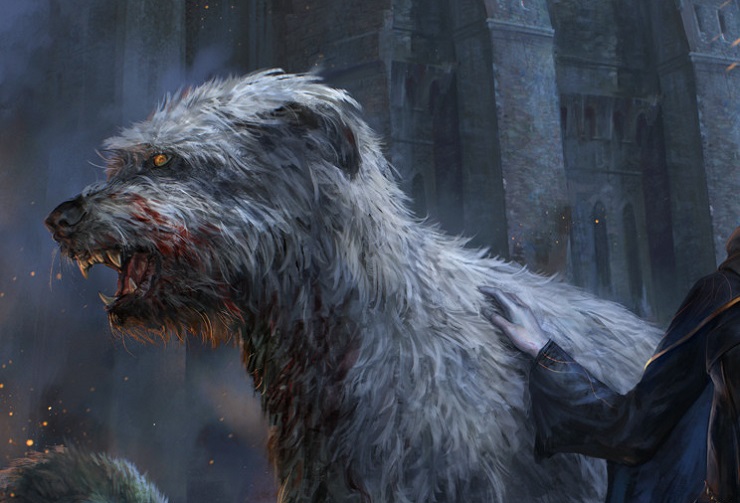
A dying Draugluin then runs back up into the tower to fall before Sauron’s feet. Just before becoming an ex-werewolf, he declares that it is in fact Huan who has come. Which to me is interesting, because I guess Sauron either wasn’t watching the fights from his tower window or else just didn’t recognize the glorious Hound of Valinor on sight (which is fair, as they’ve never met). But this gives him a new idea. Sauron, quite unlike his boss, can still freely assume different forms.
Now Sauron knew well, as did all in that land, the fate that was decreed for the hound of Valinor, and it came into his thought that he himself would accomplish it. Therefore he took upon himself the form of a werewolf, and made himself the mightiest that had yet walked the world; and he came forth to win the passage of the bridge.
Clearly someone’s ratted out Huan’s prophecy, since simply everyone knows what will spell his end. Totally unfair. So now Sauron is Wolf-Sauron—action figure sold separately from normal Sauron—who is the so-called “mightiest wolf that had yet walked the earth.” At least, as far as he knows. More about that later.
Then it’s Wolf-Sauron vs. Huan/Lúthien. He gets the drop on the hound and goes for the Elf first, but she hits him with a quick swipe of her sleepy-cloak. This only makes him drowsy, but it’s enough for Huan to tackle him, and theirs is a titanic fight that echoes through the valley and across the mountains. Finally the hound of Valinor gets Sauron in a doggy chokehold, something we can scarcely imagine ever happening to him during his War of the Ring days. He tries shape-shifting out of Huan’s jaws “from wolf to serpent, and from monster to his own accustomed form,” but it’s no use. His only way out is by doing something his minions cannot: chicken out by forsaking his physical form and fleeing in spirit form—Maia that he is. But before he does this, Lúthien makes him an offer he might not refuse. She tells him that if he departs in spirit form, it’s going to be totally embarrassing “quaking back to Morgoth”:
There everlasting thy naked self shall endure the torment of his scorn, pierced by his eyes, unless thou yield to me the mastery of thy tower.
Which, interestingly, is language reminiscent of the Witch-King’s warning to Éowyn in his vain attempt to intimidate her. This is her way of saying, “Look, just go, leave me the tower, and we can pretend you escaped on your own power with your big-boy pants on. You can tell everyone it was a ‘strategic retreat’ if you want.”
Sauron, utterly bested by hound and girl, takes her up on her offer. He shifts into a vampire, which in this legendarium is just a big bloodsucking bat, and flees to Taur-nu-Fuin, the highlands out of which he previously drove Beren. But at least he doesn’t have to go “quaking” to Morgoth, I guess…. Instead he lies low, probably hoping this’ll all blow over in time.
Now Lúthien has “mastery” of the tower. She then does what we read Galadriel does in the LotR Appendices in a different Elf stronghold co-opted by Sauron (Dol Guldur) in a future age. It’s something I think only particularly powerful Elves are able to pull off: she uses a spell to loosen the very stones of the tower, which throws open the gates and doors, probably every pantry and medicine cabinet, and at last “the pits are laid bare.” The tower is still standing; she isn’t playing Jenga with Tol-in-Gaurhoth, just letting the light back in, unbattening all the hatches.
All of Sauron’s prisoners are freed. And as many of them are from Nargothrond, they all come wandering out and start home. Lúthien goes down and finds Beren in the dungeons, thinking at first that he’s already dead as he lays in silent mourning for Finrod. She wraps him in her arms and the two share a “dark forgetfulness.”
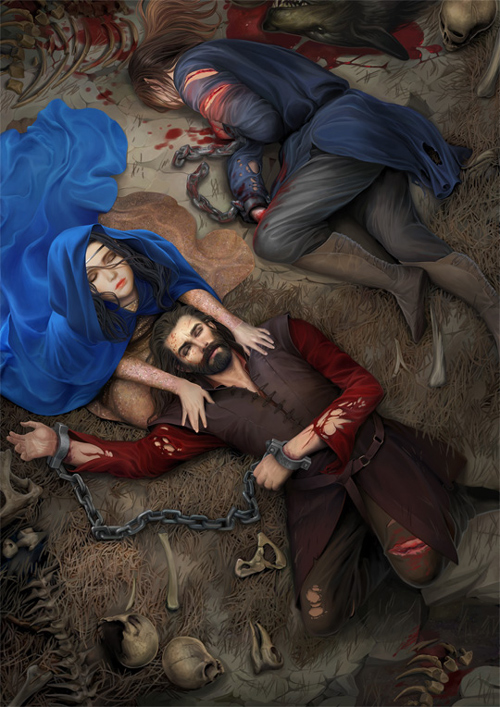
But then they’re up and out again. With the tower that Sauron had defiled now cleansed, courtesy of Lúthien’s flower power, they bury Finrod Felagund’s body at the island’s own hilltop. Thus is laid to rest the “fairest of all the princes of the Elves.” Objectively so. Just sayin’. #Finrod4ever
Now if any dog deserves a Huan Snack, it’s Huan. I’d like to think that Beren, being a friend of birds and beasts, would have at least given Huan the best scratching-behind-the-ears of the First Age. Now Lúthien and her boyfriend spend some time together in the wild, enjoying a quiet interlude in the quest. Sadly, with nothing else for him to do, Huan heads back to Nargothrond, where Celegorm dwells. The hound of Valinor chooses to remain loyal to his master despite the Elf’s chicanery. We’re not told whether Celegorm scolds Huan for being a “bad dog” by helping Lúthien escape and foil his plans, but I kind of think Celegorm wouldn’t dare.
By this point, word of Finrod’s death and Sauron’s defeat is all the news in Nargothrond, as many of the captive Elves have returned. The people turn a scathing eye to the resident Brothers C, saying that “a maiden had dared that which the sons of Fëanor had not dared to do.” Where’s your Oath now, Celegorm and Curufin? With suspicion of treason at their heels, and a real possibility that they might both have been slain by the angry crowd if not for the intervention of Orodreth, the brothers skip town. They head east, thinking to reconnect with the other five sons of Fëanor. Once again, Huan is dragged into the drama, for he sticks by his master’s side.
We’re also briefly introduced to another Elf of interest, who plays little part here but will be a major player in the Second Age. I’m talking, of course, about Celebrimbor, who is the son of Curufin. This begs some questions, not the least of which is: who the heck married Curufin? Okay, so he’s obviously a smooth talker. Celebrimbor (KEL-eh-brim-bor) is introduced here merely so we know that he doesn’t follow his father, and in fact renounces ties to him for having conspired against Finrod. This is very encouraging, as it means the apple needn’t fall so close to the asshat tree. But also, someday Celebrimbor, master-jeweler like his grandpa Fëanor, will spearhead a certain ring-making project.
Anyway, over in Brethil, that forest just outside the Girdle of Melian where Haleth’s people dwell, Beren and Lúthien have arrived. Beren decides he needs to get back to the old Silmaril quest, so Lúthien gives him two choices: proceed with the impossible, or give it up and just stay in the wild, but this time with her by his side. He’s not liking either, because while Beren is a man of honor, he does not want Lúthien in harm’s way; which of course is a bit absurd, given that she just bested Sauron when neither he, Finrod, nor their ten companions could. Before they conclude this minor couple’s squabble, fate intercedes….
Celegorm and Curufin spot them, because they happen to be seeking a shortcut on their eastward ride. Embittered by recent events, they let volatile and poor judgement override all else as they decide to overtake and punish the couple. No one shows up the sons of Fëanor and makes them look bad! (They can do that all on their own!) C-gorm actually tries to run Beren down, while C-fin scoops Lúthien right up onto his horse.
What’s interesting to me is that Lúthien, who boldly faces off against the servants of Morgoth, falls victim far more easily to the misdeeds of her own people. Perhaps this is her Achilles heel. Or it might simply be the innocence of not being directly under the curse of Mandos. I think a Noldo wouldn’t be as naïve. I mean, a quick swipe of her enchanted night-night cloak could have foiled Curufin, right? But she doesn’t manage it; that requires a readiness and resolve she rarely possesses against the Children of Ilúvatar. She did knock out her dad’s treehouse guards out once, but at least she’d planned for that.
In any case, Beren’s too fast even for the murderous charge of Celegorm—who, by the way, has been doing hunting maneuvers since riding with Oromë himself in Valinor hundreds, if not thousands, of years ago. It is no small thing to evade these guys! As sons of Fëanor, they come from especially adroit stock. Yet Beren does dodge Celegorm, and before Curufin can ride off with Lúthien, Beren pulls off a mighty feat to rescue her.
In the epic console game of The Silmarillion which I am now imagining (and which would be amazing), Beren’s player has to enact the precise controller combo to enact the Leap of Beren.

And yeah, that’s a capital “L” Leap—just so we’re clear—which is so impressive and therefore renowned already “among Men and Elves” (or will become so)! Or, more likely, becomes so from this point on and the narrator is just pointing this out. (Based on whose first-hand account, though?) The wording is unclear.
This Leap unhorses Curufin and tosses Lúthien harmlessly into the grass, and then Beren gets his hands around the Elf’s neck. But when Celegorm rides at the mortal with a spear, fully planning on killing him, he crosses a bridge too far for Huan—Huan, who’s loved his master unconditionally for hundreds of years and has watched him make one dumb decision after another. Well, this is the last straw. He intervenes and turns Celegorm’s horse aside, saving Beren, and he just stands there and takes it as Celegorm curses him for his betrayal.
After centuries of loyalty, was Huan suddenly disloyal? It depends. He was Oromë’s dog first, and he was holding true to the virtues of the Valar in preventing Speary McMurderspear from killing Beren, who certainly doesn’t deserve it. Not that the Valar themselves would interfere in this way, especially with a Man. But this is a dog, and he’s his own person. He’s made his choice. In Huan’s book, Celegorm no longer deserves to be his master.
Only at Lúthien’s request does Beren spare Curufin, still at his mercy, but he does take the Elf’s loot and horse. The greatest prize is the knife Angrist, which we’re told was forged by Telchar, the same Dwarf in Nogrod who goes on to forge Narsil (and another notable item—not that Beren would know any of this). Curufin curses Beren for having foiled his unjustified attempted Man-slaughter, wishing him a terrible death in all his future endeavors. Then the C-brothers ride off. Finally.
Oh wait, not quite. Curufin gives in to one final impulse of douchebaggery, grabs his brother’s bow, and shoots an arrow…at Lúthien! The two lovers weren’t ready for that, but of course Huan was; he snatches the arrow out of midair before it can hit her—

—but a second arrow follows just after, because Legolas isn’t the only Elf who can rapid fire. But this time Beren (of Leap of Beren fame!) jumps in front of her, taking the missile instead; down he goes with an arrow in the chest! Not right in the heart…but close enough. Huan chases off the two Elf-shaped scumbags while Lúthien treats Beren’s horrid injury. And “by her arts and her love” and an herb Huan fetches like the awesome dog he is, Beren’s wound is staunched and he is healed. Elves of the First Age are no joke. Thus they resume their return to Doriath.
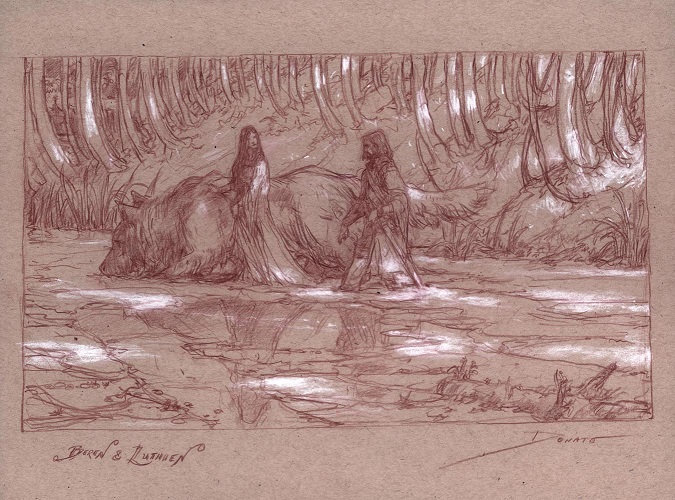
However, their doom-based lovers’ quarrel hadn’t properly concluded. So Beren decides to make the choice for them both, though he is “torn between his oath and his love.” He just wants her safe. And even though we as readers fully grasp that Lúthien is powerful, no shrinking violet among Elves, all one has to do is picture the person they love the most (a spouse, a child, an awesome dog), and then imagine taking that person with you to a place of unassailable evil, where many have been slain or tormented. It’s almost a no-brainer to Beren. So while Lúthien is sleeping, Beren gets up early, asks Huan to look after her, then rides off on Curufin’s horse—alone again and heading due north. Next stop: Angband.
When he reaches the south end of Anfauglith, Beren looks across the blasted plain and the peaks of Thangorodrim. He knows it’s going to get especially bleak from here on out, so he turns and speaks his farewells to all light and life. But he finds a silver lining in at all: even if evil wins, and all falls to ruin and death and the world itself is completely unmade and reverts back to the void, it will all have been worth because Lúthien did exist in it. He sings this lament openly, “caring not what ear should overhear him.”
But his moment of sweet melodrama is helpful, as Lúthien discern his location. Huan allows himself to be ridden again, and together they chase after Beren. What part of “on either road I shall go with you” didn’t he understand?” Men, the Secondborn of the Children of Ilúvatar, sure can be headstrong. Luckily, Lúthien and Huan can be just as dogged. Especially Huan; he loves these two crazy kids and just wants to help them out.
In pursuit of Beren, Elf and hound take a quick detour at the island where she ousted Sauron and where Finrod was buried; they have an idea for a disguise that might be needed as they get closer to Morgoth’s domain. It turns out that not only did their shakeup at Tol-in-Gaurhoth involve Huan killing a number of werewolves, but there were other servants of Sauron taken down in the collateral damage. I sure wish we got more information than that, but alas…
One such victim was Thuringwethil (thoor-in-GWETH-ill), a messenger of Sauron’s whose job was to relay information to and from Angband. Now what she was is unclear, but “she was wont to fly in vampire’s form,” which sort of implies that she, like Sauron, was capable of shape-shifting. Be that as it may, this bat-woman was slain, possibly during the battle between Huan and Draugluin, or maybe when Lúthien took the mastery of the tower with her spell-song.
Whatever the manner of the vampire’s demise, Lúthien and Huan stop in, claim Thuringwethil’s “bat-fell” (her skin) and Draugluin’s “ghastly wolf-hame” (his pelt). Donning these hideous hides, they proceed on, and every creature in their path gives them a wide berth. At a glance, they look like the father of all werewolves and a vampiric Batgirl. And after giving Beren a well-deserved fright when they finally reach him, the three are united again. While happy to see the fair face of his girlfriend, Beren is still greatly dismayed that she’s so set on coming with him to the worst place on Middle-earth.
And that’s when Huan uses his Speaking Allowance #2 to set Beren straight. Not only is this dog their savior and friend, he’s also their wise counsellor. He points out to Beren that already Lúthien cannot be saved from “the shadow of death”—we’re past that now, dummy—because her love for him has already brought that upon her. Beren takes this to heart, and he’s now resolved to go forward into darkness with her.
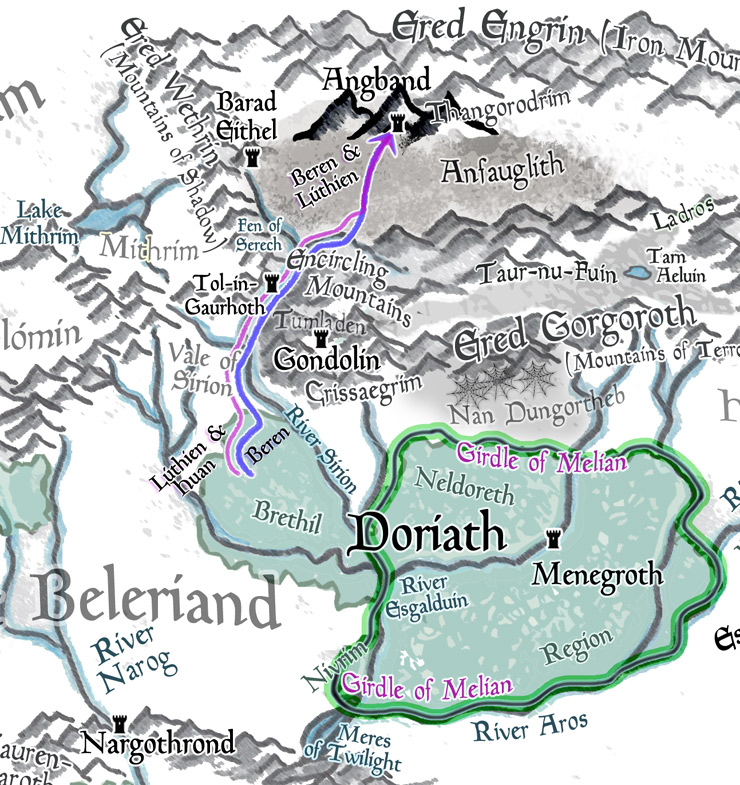
Huan also points out that he needs to turn back now; he senses his own prophesied death approaching and decides this isn’t supposed to be his moment. Not quite yet.
Beren now takes on the skin of Draugluin from Huan, and with Lúthien’s arts (so very much like Finrod’s), she is able to make it merge with him so that he becomes like a werewolf in body—almost even in mind, “save that in his eyes shone a spirit grim indeed but clean.” Now he’s basically Wolf-Beren (action figure sold separately). Likewise, Lúthien again dons the bat-fell and transforms herself into a she-vampire.
Then howling under the moon he leaped down the hill, and the bat wheeled and flittered above him.
Such romance! Then it’s onward to Angband again…

They are uncontested by Orcs or wolves all across Anfauglith, the plain of Gasping Dust. Why would anyone dare to bar their way? Look, it’s two of the nastiest creatures in all Middle-earth, traipsing across one of the nastiest places in Middle-earth. Clearly their business is aboveboard.
But there at the front door, near where Fingolfin met his fate, is an even bigger and scarier werewolf than anyone’s ever seen: Carcharoth, the Red Maw, aka Anfauglir, the Jaws of Thirst, “a guard of whom no tidings had yet gone forth.” Not even Sauron, it seems, knew about Carcharoth (CAR-khar-oth), whom Morgoth had bred from Draugluin’s own offspring and fed “with his own hand upon living flesh.” As with many of his minions, Morgoth has seeded some of his own ex-Vala might into this beast. It is not a happy life he’s given this dreaded wolf.
Swiftly the wolf grew, until he could creep into no den, but lay huge and hungry before the feet of Morgoth. There the fire and anguish of hell entered into him, and he became filled with a devouring spirit, tormented, terrible, and strong.
Carcharoth is Morgoth’s answer to Huan. He’d heard of the hound of Valinor, and more importantly, heard of the prophecy. So this monster was bred to be the mightiest wolf that ever walked the earth. It’s a minor point, but I think Charcharoth’s very existence sheds some light on the lack of trust between evil spirits, even the top brass. Had Sauron known that his boss had bred this wolf-monster precisely to fulfill Huan’s prophesied doom, you’d think he wouldn’t have tried that Wolf-Sauron stunt earlier. Clearly Sauron is on a need-to-know basis.
And now Carcharoth’s been ordered by Morgoth to guard his front door, denied sleep, denied satiation, denied joy—a creature of hunger and savagery, tame enough only to be a Cerberean watchdog. Beren and Lúthien take stock of the situation, and it’s not great. Carcharoth looks like bad news. When they come in close, Carcharoth refuses them entry, of course, and according to The Lay of Leithian—the epic poem this entire story is based on—he even does so with words. Why not? Werewolves can speak.
Carcharoth is more or less fooled by their ghastly cosplay, but he does detect Lúthien’s natural Elf perfume; he’s pretty sure the iron-clawed, leather-winged messenger of Sauron doesn’t ordinarily smell this nice. But also…Draugluin? Word on the street was, the sire of all werewolves was dead, so…who’s this old ’wolf? Something ain’t right.
Lúthien’s got the solution. They don’t bother trying to fight Carcharoth; she puts him to sleep instead with a side order of compassion:
Lifting up her hand she commanded him to sleep, saying: ‘O woe-begotten spirit, fall now into dark oblivion, and forget for a while the dreadful doom of life.’
So Carcharoth takes a merciful and badly-needed snooze, and down into Angband our heroes descend, through its maze of stairs and dungeons, down into its bowels. They raise no alarm—their disguises hold—until they finally reach the “nethermost hall, that was uplifted by horror, lit by fire, and filled with weapons of death and torment.” Here is the Dark Enemy of the World’s court with all its Balrogs, trolls, Orcs, wolves, serpents, and Eru knows what else. And the centerpiece? Morgoth himself upon his throne, his crown of iron lit with the three Silmarils affixed therein.
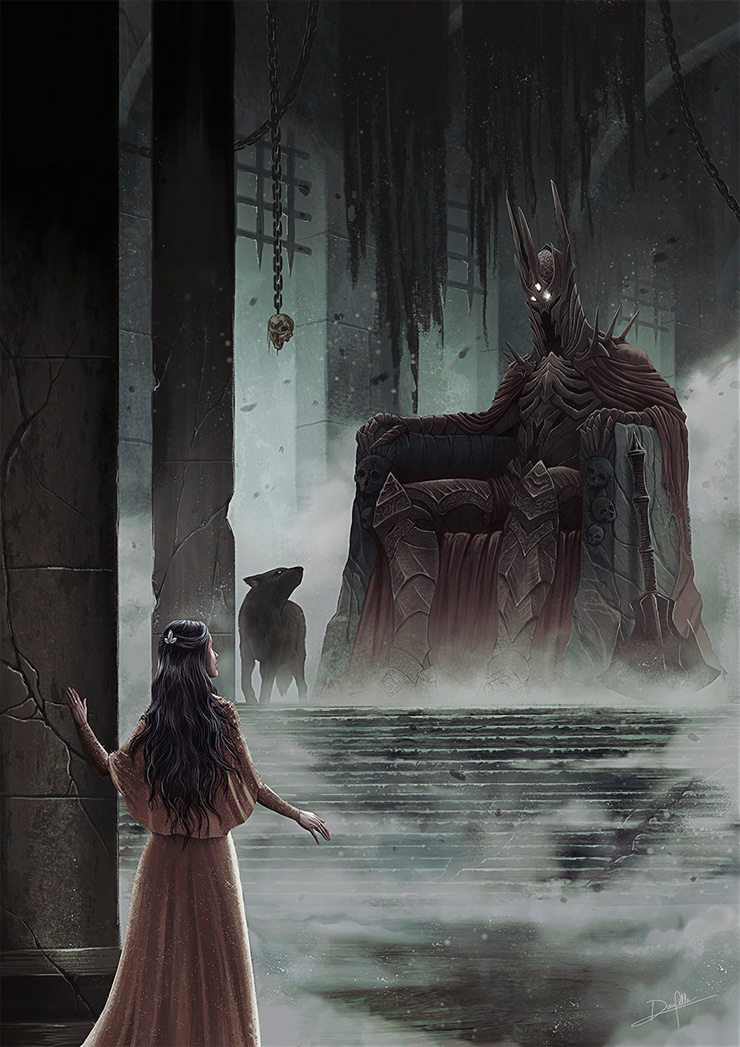
They don’t succeed in sneaking in, if that was ever even the intent. Instead they stand before the “mightiest of all the dwellers in Eä” and all his dark court. (Or at least he was the mightiest; Morgoth’s dwindled quite a bit since his Valinor days.) As is often the case, the Lay of Leithian provides a bit more of an idea of who and what’s involved:
Beneath a monstrous column loomed
the throne of Morgoth, and the doomed
and dying gasped upon the floor:
his hideous footstool, rape of war.
About him sat his awful thanes,
the Balrog-lords with fiery manes,
redhanded, mouthed with fangs and steel;
devouring wolves were crouched at heel.
Yes, that’s Morgoth using a mound of the dead and dying, slaves he’d won from war, as an ottoman. This guy is the absolute worst. And so in this chamber, Beren and Lúthien are the most vulnerable they’ve ever been—thoroughly outnumbered and outgunned, but not without a chance. Remember, they’re not here to slay anyone, only to abscond with a single Silmaril! When all is said and done, this is a jewel heist.
Beren is ineffective at first. He’s utterly disquieted by the majesty of this place. This hall is filled to the brim with all the sorts of villains he and his dad had fought and ultimately lost against for years. Plus, Beren is still quite lupine; he immediately cowers at the foot of Morgoth’s throne with the other wolves. His “spirit grim indeed” is actually congruous to this place. But this is also no ruse; he is intimidated, and fortunately quite beneath the Dark Lord’s notice for now.
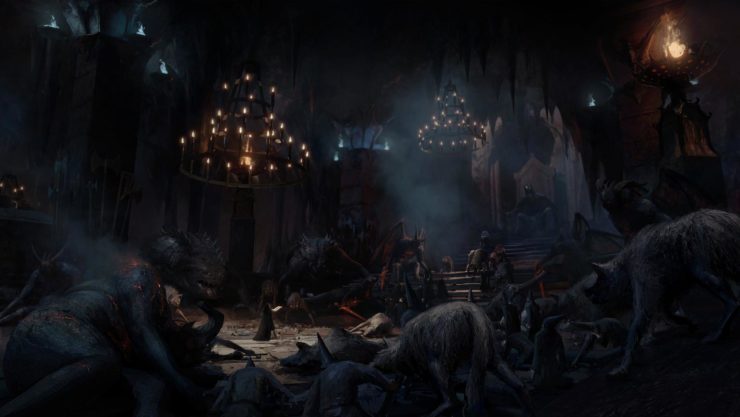
Yet at Morgoth’s command, Lúthien’s vampiric veil is swept away, so she owns up to who she is, if not why she’s there. The daughter of Melian stands up to the Dark Lord’s lascivious gaze, introduces herself as herself, and offers to sing for him.
So perform Lúthien does, turning an entrancing dance into a song of power. Again, Lúthien never seems to kill anything, but her divine blood, through mama Melian, has given her a supernatural ability to dulcify, if not straight-up tranquilize other creatures. But it does take a great reservoir of energy to do it. Magical sleep overtakes the entire throne room—Wolf-Beren included!—while Morgoth merely gets drowsy, eyes heavy and blinded, and then the three Silmarils in his crown blaze forth in response. They’ve never been so heavy, bowing him down with the weight of “care, of fear, and of desire.” As if his own evil has turned to a leaden weight upon him.
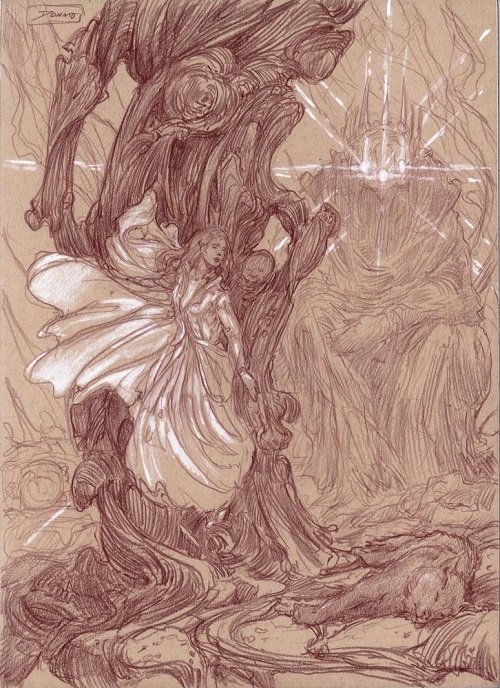
And since the Dark Lord requires a little extra, Lúthien leaps before him with a flourish of her Sleepytime Cloak®, using it to finish him off. There’s no harming him, but it places him in a dream so dark it recalls the Outer Void itself, where he first wandered alone before the universe itself was made. This dream brings him down, tumbling out of his throne and hitting the ground “like a hill sliding in avalanche,” sending the iron crown rolling away. Whereupon Lúthien hurries and wakes Beren, shaking him out of his sleep and his hairy disguise. All the bad guys are asleep, but for how long? They must hurry!
And suddenly it turns out to have been rather fortunate—if fortune it was—that they ran into Celegorm and Curufin much earlier: It sure seems like only a blade forged by Telchar the Dwarf, such as Angrist, the knife Beren took from Curufin, is hard enough to pry free a Silmaril from the infamous iron crown. And it does, and at last Beren has one of the Silmarils in his hand—
Heyyyy, we might wonder, shouldn’t his hand be “scorched and withered” by touching a Silmaril? Beren’s is a mortal hand—a very mortal hand. Yes, though Varda the Lady of the Stars personally hallowed these gems to do harm to “mortal flesh,” or “hands unclean,” or “anything of evil will,” they don’t harm Beren at all. What gives? Well, this was his fate, his doom, so if he’d stay the course (which he is doing), he’ll not be punished (i.e. scorched) for it. Here he’s doing what no son of Fëanor ever dared for all their lofty oaths.
Still, Beren, who is clearly unfamiliar with the old “bird in hand” saying, gets the bright idea to try for all three Silmarils in Morgoth’s crown. Well, when else is he going to get this chance? Never is when. It’s not in the cards to win back all the Silmarils. That’s overreaching. So when he goes for it, Angrist snaps and a fragment of the blade smacks Morgoth in the face. He starts to rouse from his Lúthien-induced slumber. Out of all the monsters in the room that piece of Angrist could have hit, it has to be him, the one whose waking would spell real disaster. I bet Mandos knew this would happen…
“I’m so bad at whittling,” someone in Valinor might say at a party at some point later. “I bet if I tried to carve a basic walking stick, I’d be the first person in all of Arda to snap the blade in the process, and I bet a piece of it would go flying and hit someone in the cheek.”
Well, with Morgoth starting to wake up, Beren and Lúthien get the hell out of there. Up and up, back through the levels of Angband, heading to the exit. Lúthien is totally empty of spells and tricks, utterly drained by daring—I can’t emphasize this enough—what no son of Fëanor ever does, while Beren leads the way with a hand that can’t contain the brightness of the Silmaril. And that’s when they find Carcharoth waiting for them at the top of the many stairs. Carchy is refreshed from his own Lúthien-induced nap and now bars the way out—and this time the daughter of Thingol has got zilch. She’s running on fumes now.
Beren boldly brandishes the Silmaril in his hand, thinking it will scare off the great wolf. And boy does he underestimate the Red Maw, the goddamned Jaws of Thirst, whose devouring spirit sees living flesh as a meal, to say nothing of an out-thrust mortal hand. And the blazing and hallowed Silmaril? No, that’s not exactly a harmless little light, but an impulse is an impulse.
I mean, What Would Ungoliant Do?
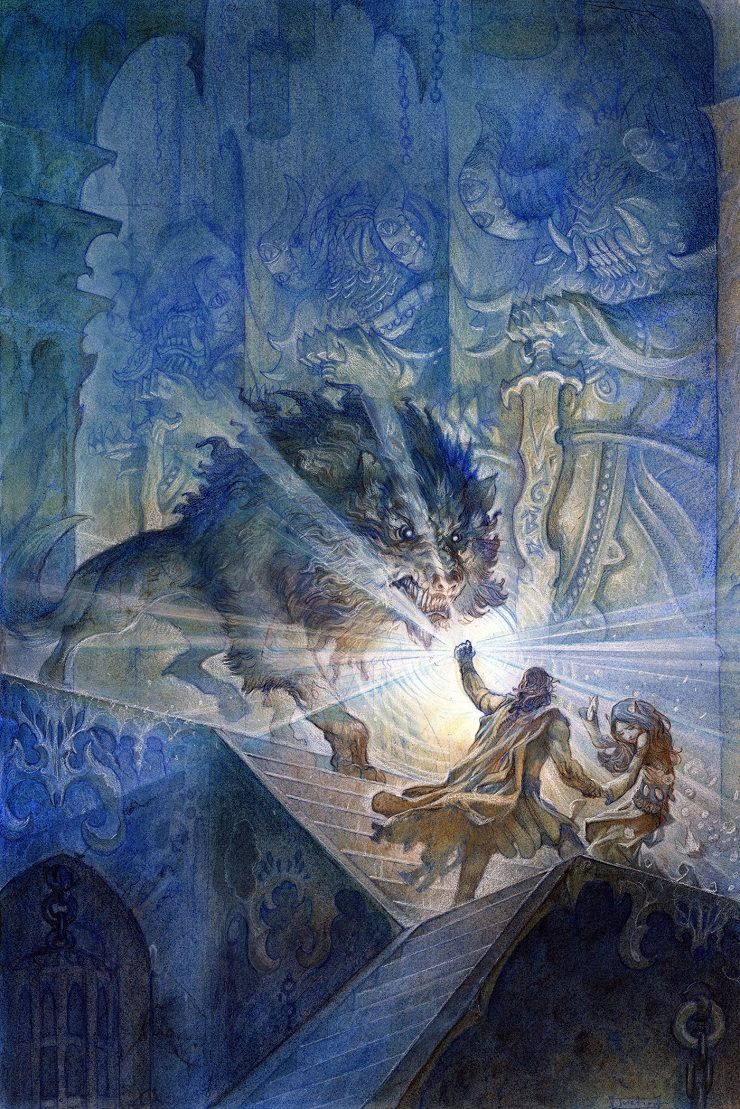
Carcharoth bites Beren’s hand clean off at the wrist and swallows it, Silmaril and all—then immediately regrets it, but it’s too late for them both. The great wolf runs off in agony, burning from the inside out, while Beren swoons, bleeding and poisoned by the evil of Carcharoth’s fangs. But Lúthien is the best fiancée you can imagine; she places her lips to the dismembered arm and sucks out what poison she can. (Boy, has this date taken some weird turns!)
From this point on, Carcharoth is a capital “W” sort of Wolf. Saturated with the doom that surrounds the gem inside him, it seems to augment his ferocity:
Of all the terrors that came ever into Beleriand ere Angband’s fall the madness of Carcharoth was the most dreadful; for the power of the Silmaril was hidden with him.
Tolkien’s not joking around with that kind of talk! Balrogs have issued forth from Angband. Glaurung, the father of dragons, has come forth twice already and will do so again (and do some really terrible things when he does). And yet none of these are counted as dreadful as Carcharoth’s episode of wigging out. So off he goes, rampaging in agony, killing everything in his path.
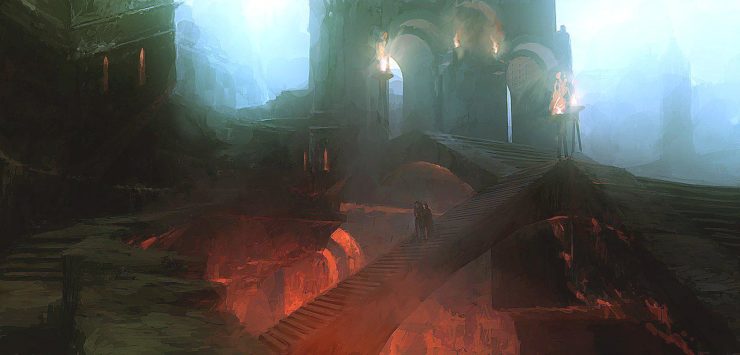
Beren is useless, nearly dead due to blood loss and Morgoth-infused werewolf poison, while Lúthien is severely taxed. Just when all of Angband’s hosts would be upon them, in swoop the Eagles! Manwë’s special ops! So is this an unlooked-for, Eagle-based eucatastrophe? Maybe, but not necessarily. We’re told that after parting company with his two favorite bipeds, Huan got the word out among animals of the region to watch for them. And you know Thorondor, the King of the Eagles, was going to be among the first to hear it. He might have already been on the lookout for these two kids. Not to mention the fact that the vegan Beren has been a “friend to birds and beasts” ever since roughing it solo in the wilds of old Dorthonion.
Fire and smoke and a great riot of thunder rolls out of Thangorodrim even as Thorondor and his Eagles fly them out of there. Morgoth is pissed. He’s been tricked and robbed by Melian’s little brat—Melian, who was there with him when he’d been trying to screw up the Music of the Ainur so long ago—and that goddamned, flea-bitten mortal Man! Boy oh boy, is he going to pay more attention to Men now.
Meanwhile, Lúthien gets the best views from the back of her Eagle—say, isn’t that the Hidden City of Gondolin down there?—but she takes no time to enjoy them. Beren is dying; this is no mere flesh wound.
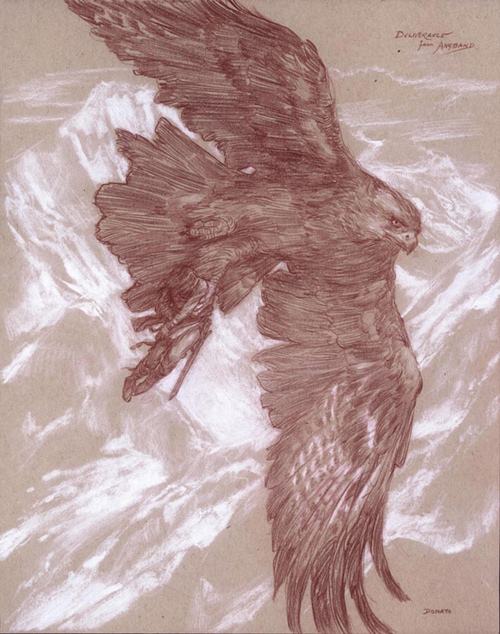
When Thorondor drops them off at the border of Doriath, she puts all her skill to healing him, if she can. Huan arrives and helps her a second time in mending this mortal Man who sure does a bang-up job of getting banged up.
Beren lingers on the edge of death for a while (it’s kind of his thing now). Finally, he awakes, mended enough to recover (minus one hand) and the lovers enjoy a second peaceful interlude. The quest, this time, is only kinda sorta completed. It’s just that the Silmaril Beren had acquired is now roaming the countryside in the belly of a very large and very dangerous wolf. One so terrible that it destroys everyone and everything in its path, even Morgoth’s other minions.
At this point, Tolkien seizes another opportunity to hand out another nickname, and Beren gets called, Erchamion, the One-Handed. At this point, Lúthien again is content. She’s already signed up for the doom of Men by loving Beren and choosing to be with him, and is willing to leave her family and her people behind indefinitely. But Beren is an honorable Man and won’t have that. To whatever end, he chooses to square up with Thingol, return the Elf-king’s daughter to him, and deal with the consequences.
In the meantime, Thingol has been dealing with the consequences of his own choices: the things Melian warned him about. And when he finally turns to her for further counsel, she has nothing to say. It’s all been said, and now he just has to wait. Messengers had come to him from Celegorm—yeah, that jerk still isn’t through—bearing lies mixed with truths. Beren’s dead. Finrod’s dead. Oh, and he and Lúthien are getting hitched out in Nargothrond. Didn’t he get the invitation? Now Thingol’s truly distressed. At least that mortal boy accepted a quest to win Lúthien’s hand in marriage; now a son of Fëanor is just going to take it? Nuh-uh. So, should Thingol now wage war against Nargothrond? Step one is to find out if Celegorm is lying, so he sends messengers out to seek out the less disreputable sons of Fëanor for help in finding Lúthien.
But Carcharoth, who’s been on his mad rampage in the north, comes raging right through the Girdle of Melian. Bound up in the doom that itself clings to the Silmaril in his belly, even the queen’s power could not keep him out. Thingol’s messengers are all slain when they run into the Wolf, except one: Mablung, who is later called the Heavy-handed (for reasons we’ll get to soon), a Sindar captain. He returns to Thingol to warn about the dreadful beast tearing up northern Beleriand.
At which point the two threads of the story weave back together, for Beren and Lúthien then return, to great fanfare among the people. Thingol and Melian are happy to see their daughter safe and sound and nowhere near that Celegorm creep, and I have to imagine Lúthien at some point asks him if he really thought a treehouse was going to contain her. But the Elf-king regards her no-good boyfriend warily. Beren then pulls a good one on this ancient king; Carcharoth has taken his right hand, but not his sense of humor.
‘What of your quest, and of your vow?’
But Beren said: ‘It is fulfilled. Even now a Silmaril is in my hand.’
Then Thingol said: ‘Show it to me!’
And Beren put forth his left hand, slowly opening its fingers; but it was empty. Then he held up his right arm; and from that hour he named himself Camlost, the Empty-handed.
He got him good with that one, did ol’ Camlost! But c’mon, Beren, which is it? Erchamion or Camlost? One-handed or empty-handed? I guess you can be both…
This marks a big turning point for Thingol. He is starting to come around on Men, mainly because of this one apparently-wise-cracking-but-heroic guy who’s been to hell and back—kind of literally—for Lúthien. He did get a Silmaril in his hand, as promised. That the Silmaril is inside a monster wolf right now is a technicality. So, realizing that both this Man and the love he has for Lúthien are truly something special and that it “might not be withstood by any power of the world,” Thingol at last consents to their marrying. There, before his throne, the two are wedded.
But there is still the Wolf problem at hand (pun mostly intended). Carcharoth’s presence in the forests of Doriath puts everyone in serious danger, so Beren organizes a great hunt. The roster includes himself, Huan, Mablung the Heavy-handed, Beleg Strongbow (the chief marchwarden), and even King Thingol himself! The best of the best. And although this time Lúthien does remain behind (she’s a spell singer, not a ranger or hunter), her role in all this isn’t finished yet. In fact, her greatest trial is still ahead.
In a dark valley the hunting party zeroes in on Carcharoth, where the giant Wolf has stopped to drink in the cool waters of the River Esgalduin—finding some all-too-brief relief from the agonizing holy hellfire still burning within him. Things get crazy fast, and Carcharoth manages to shake off Mablung and Beleg before going after the others.
There is more stalking and hiding, a fierce melee of snapping teeth, stabbing spears, and lots of lunges.
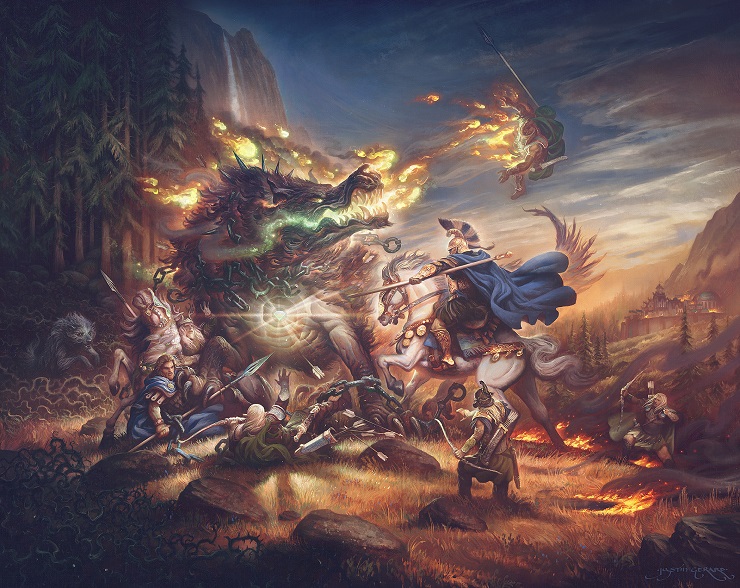
Beren saves his father-in-law by getting between him and the leaping Wolf, but gets chomped on and “felled” in turn. These are now the worst injuries he’s ever had; this is no patch job. Thingol goes to his side, obviously struck by the gravity of all that Beren’s done. Beren is dying (for the third time). Both Man and Elf would be goners, though, if it weren’t for Huan, who comes bounding out of the foliage to the rescue!
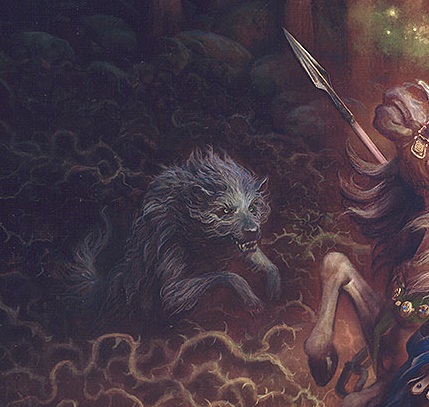
Huan now completely takes over the fight, wrestling with the Carcharoth in a contest we can scarcely imagine. As with Fëanor’s tangle with the Balrogs, and Fingolfin’s scuffle with Morgoth, this conflict is all too briefly described, for “no battle of wolf and hound has been like it.” These two canines are like the champions of all the powers behind them. In the baying of Huan “was heard the voice of the horns of Oromë,” while the “hate of Morgoth” lay behind the howls of Carcharoth. I can’t help but picture all the Valar gathered together in Manwë’s tower atop Taniquetil, watching the showdown through his Varda-enhanced Seeing Stone (or whatever he uses). Tulkas has got to be so jealous of Huan right now.
The ground shakes, rocks are loosed like an avalanche. And then it’s done: Carcharoth is slain!
But Huan has tangled with the “mightiest wolf that would ever walk the world,” and Morgoth-powered venom courses through his wounded body. Dying, he lies down next to Beren—the best dog that ever there was. Loyal to the end. Loyal to his end. And Huan has even saved his Speaking Allowance #3 until this moment, which he uses to say goodbye to Beren in spoken words. Beren himself can’t even speak, he’s much too weak. He just puts his one hand on the hound’s head.
Mablung and Beleg catch up at last and take in the tragic scene. Interestingly, Mablung is credited with being the Elf to tear open the dead Wolf’s body and remove the Silmaril. Now there’s no reason why he wouldn’t be able to touch it—he is not mortal nor of evil will—but he’s quick to pass it along to Beren just in case. Also interesting: in The Shaping of Middle-earth, there’s an extra detail about him this moment. When he picks up the Silmaril, he finds it “so great a weight that Mablung’s own hand was dragged earthward and forced open.” Hence his epithet “of the Heavy Hand,” which is what his name means in Sindarin. Were one of Mablung’s parents foresighted? “Someday this boy’s going to pick up something very heavy.”
Anyway, Beren, upon holding the Silmaril, then places it in Thingol’s hand.
‘Now is the Quest achieved,’ he said, ‘and my doom full-wrought’; and he spoke no more.
Beren and the body of Huan are carried back on to Menegroth. Lúthien comes to him and holds him; no one makes any attempt to heal Beren at this point. Tolkien isn’t explicit, but we known that Carcharoth had bitten away at him. He’s far too torn up to be mended.
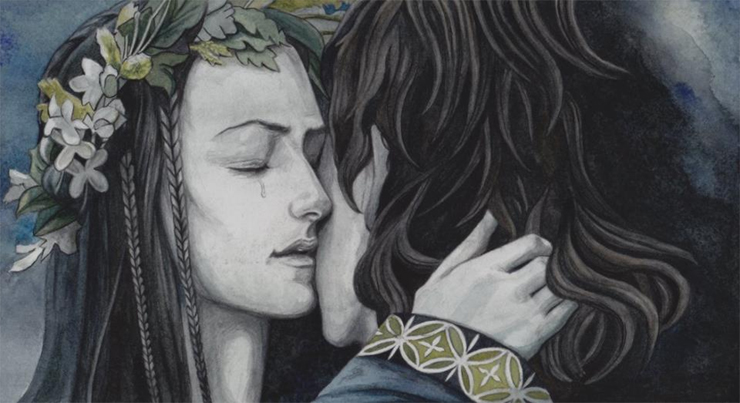
Lúthien knows this is the moment of her husband’s death, and thus we come to her final ordeal. First she kisses him, “bidding him await her beyond the Western Sea.” She knows that his spirit is destined to move beyond Arda and be utterly unreachable to anyone within it. Yet it seems that the spirits of Men do at least stop through the Halls of Mandos on the way out—in fact, she’s sort of counting on that.

So when Beren appears there in Mandos, as a spirit at the far edge of Aman “on the dim shores of the Outer Sea,” he stops. He tarries as sure as a Teleri Elf tarries at a woodland stream. Lúthien asked him to wait for her, and so he does. Is he supposed to be able to do this? Who knows! But Beren does, because his Tinúviel bade him to.
Now, Beren has no real idea what the gift of death will bring, what fate lies beyond Arda for all Men—the good or the bad. He will go where his father has gone, he may suppose, and maybe it’s somewhere awesome, or just another stepping stone in existence, as designed by Ilúvatar. But either way he’s not going anywhere until Lúthien herself comes to the Halls of Mandos, too, to say a last farewell. Whether in body, or in spirit form if she herself is slain in violence, he’ll wait for that day before moving on. How long will she live? Eru, this could take forever!
As it happens, he doesn’t have to wait long after all. Lúthien just allows herself to fall into darkness, and her spirit departs her body. She is effectively dying, leaving grieving parents behind, so she, too, comes to Mandos—to that same unearthly estate where even the Elves cannot go in body. Only the slain—Finwë, Fëanor, Finrod, Aredhel, and so many unnamed others—come to this place and “sit in the shadow of their thought” for however long the Valar deem. Lúthien, not yet finding Beren, then goes right up to Mandos himself, kneeling, and she sings.
The song of Lúthien before Mandos was the song most fair that ever in words was woven, and the song most sorrowful that ever the world shall hear.
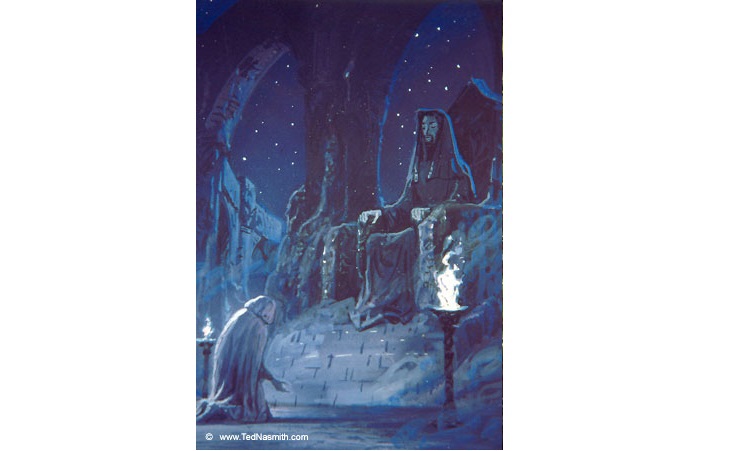
Now listen. This lady has performed in some impressive venues: Menegroth, all over Doriath, the bridge at the Isle of Werewolves, then a command performance at Angband in Morgoth’s own throne room. Yet none of those, not even her music before the face of evil itself, are as important as this performance here in the Halls of Mandos. She sings of both “the sorrow of the Eldar and the grief of Men,” two Kindreds who are inevitably going to face challenges because of the vast difference in their lifespans and their very relationships with death. The fact that Lúthien, who should have lived on as long as Arda itself, has chosen to love a mortal Man illustrates this; she is submitting herself as the case in point.
Mandos, the utmost goth of the Valar, is “moved to pity”—maybe because he’s goth and we who like dark music are suckers for a good dirge or threnody. So he summons the spirit of Beren before her, reuniting the lovers…for the moment. Mandos is the Doomsman and summoner of the dead, but possesses “no power to withhold the spirits of Men that were dead within the confines of the world,” and he cannot alter Lúthien’s nature as one of the Eldar. So he turns to Manwë, who has far more insight into the workings of the big guy upstairs. Within him, he finds Ilúvatar’s will, and then the choice is given to Lúthien:
- Go alone to Valinor proper, hang with the Valar, Maia, and the Elves who remained with them—all without Beren. He would then go on… to where all Men go. This is the status quo choice.
- Or return to Middle-earth—with Beren. There to “dwell again, but without certitude of life or joy,” and to become mortal like him and therefore “subject to a second death” when it is time.
Lúthien didn’t break from innumerable bonds, defy her parents, throw down with both Sauron and Morgoth, and save her betrothed several times over to now go with the safe choice. She chooses the gothiest option: love, and death—and this means she will never return again to Aman, and soon enough she will have to leave her parents behind as well, to whatever big-picture end Ilúvatar has devised.
“Spoiler” alert: The narrator forecasts a bit, and tells us that Lúthien will live on, effectively, as a woman among Men, and then “die indeed” with Beren after they get to spend some more time in the world. But also that her choice unites the Firstborn and the Secondborn in an unprecedented way. She becomes the forerunner of others to come, as readers of The Lord of the Rings will already know.

But there’s still plenty of drama to be seen between the time of Lúthien and those descendants. This means, moreover, that she and Beren will live long enough in Middle-earth to have a kid. And even though the aftermath of her choice comes in the next chapter, we also will see Beren again in a future chapter. He comes back from death—the only Man who ever gets to do so, and only because of the girl he chose to be with—but before dying a second time, he will get one last moment in the spotlight.
In the next installment, we’ll look at Chapter 20, “Of the Fifth Battle: Nirnaeth Arnoediad,” which is both a mouthful to say and a series of unpropitious events. But we’ll also get a little bit more closure for Beren and Lúthien. The real question is: will Beren get a new hand for this second phase of his life?
Top image from “Lúthien and Húan in Tol-in-Gaurhoth” by Randy Vargas
Jeff LaSala sure would love to have a Sleepytime Cloak®, too, especially when negotiating with a 4-year-old who regularly boycotts bedtime. Tolkien geekdom aside, Jeff wrote a Scribe Award–nominated D&D novel, produced some cyberpunk stories, and now works for Tor Books. He is sometimes on Twitter.










